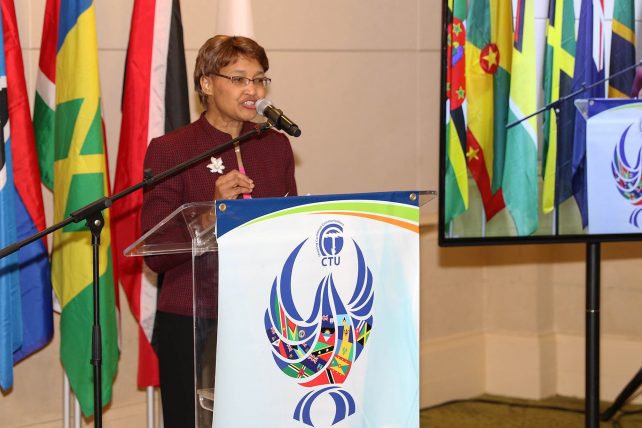
Still reeling from the utter devastation wrought by a record-breaking 2017 hurricane season, many Caribbean island states are struggling to return to normalcy. By some estimates, relief and recovery efforts after Hurricanes Irma and Maria alone could cost upwards of US$150 billion.
The failure of Caribbean communications networks is particularly worrying. Mobile and Internet technology affect not only the personal communications between millions of citizens but, more critically, are vital to the coordination of emergency responders’ post-hurricane recovery efforts. Increasingly severe weather events are highlighting an urgent need to strengthen the region’s communications infrastructure.
In response, a special Commission for Caribbean Communications Resilience is being formally empaneled to critically examine the region’s communications vulnerabilities and come up with recommendations for more resilient infrastructure, technologies and methods.
The formation of the Commission was announced this week by the Caribbean Telecommunications Union (CTU), an inter-governmental entity formed by the Caribbean Community (CARICOM) to drive the growth of the region’s communications sector.
“There were many deficiencies exposed in the Caribbean’s response to recent hurricanes and disasters in the region,” said Bernadette Lewis, Secretary General of the CTU. “This special Commission will gather facts about the failures, in order to better understand which ones contributed most significantly to the overall outage. We will develop a set of practical recommendations as to how things can be done better in the future.”
On November 29, one day before the official end of the 2017 Atlantic hurricane season, Lewis made the announcement during the CTU’s sixteenth Caribbean Ministerial Strategic ICT Seminar, held at the Atlantic Paradise Island Resort in The Bahamas.
The Commission will produce a report with specific recommendations to Caribbean governments, regulators and communications ministries. The recommendations will be presented to Caribbean governments at a meeting convened for that purpose by regional inter-governmental treaty organisations the CTU and the Organisation of Eastern Caribbean States.
Lewis will chair the new body, and Kim Mallalieu, head of the Computer Science department of the University of the West Indies, will be vice-chair. It will initially be made up of ten commissioners drawn from regional and international experts on communications technology and regulation.
“The Commission will be neutral, in that none of the commissioners will be from the companies whose infrastructure failed, nor companies seeking to compete with them, nor regulators with jurisdiction over them,” Lewis said.
Among others, global technology companies Cisco, IBM, Intel and Uniregistry and international treaty organisations the World Bank and Organisation of American States are supporting the project and overseeing the Commission’s work.
Several regional organisations are also supporters, including the national telecommunications regulators of St Vincent and the Grenadines and Grenada, as well as the Caribbean Network Operators Group.
Among the Internet bodies supporting the initiative is Packet Clearing House (PCH), the international organisation responsible for providing operational support and security to critical Internet infrastructure, including Internet exchange points and the core of the domain name system.
“Packet Clearing House is honoured to be participating in this effort,” said Bill Woodcock, who is the executive director of PCH, and one of the ten commissioners. “The scale of the devastation wrought by this season’s hurricanes is unmatched in recent communications history. Having two entire countries go offline through the critical period of evacuation and humanitarian relief is a failure that cannot be allowed to happen again, and the challenge that climate change presents in the Caribbean will continue to increase in future years.”
Another institutional supporter of the newly formed body is the American Registry for Internet Numbers (ARIN), which is one of five registries worldwide coordinating Internet number resources. ARIN’s region covers much of the Caribbean, as well as Canada and the United States. Among the islands hardest hit by the 2017 hurricane season are Anguilla, Barbuda, Dominica, Turks and Caicos, and the British Virgin Islands, all of which are served by ARIN.
“We offer our sympathy and condolences to all who suffered loss. We are pleased to also be able to offer our resources in support of the work of this important Commission. A well-considered and unified plan to build and maintain resilient Caribbean communications infrastructure is a humanitarian necessity and our collective responsibility,” said Commissioner Bevil Wooding, who is the Caribbean Outreach Liaison at ARIN and a founding member of the Caribbean Network Operators Group.
In 2017, Hurricanes Irma and Maria made landfall in Anguilla, Barbuda, Dominica, the Dominican Republic, Puerto Rico, St. Barts, St. Martin/Sint Maarten, Turks and Caicos, the British Virgin Islands and the United States Virgin Islands.
On June 1, 2018, the next Atlantic hurricane season begins. The establishment of the Commission is a positive and necessary step, to increase the resilience of regional communications infrastructure to extreme recurrent natural events.
This story was originally published on Gerard Best’s blog, SightLine.

We don’need yet another quango that eats money before it gets to people who really need it. I am sorry but we need fewer “bodies”, not more. My experience is that where action is needed the shortest chain of supply is always the best and least costly.